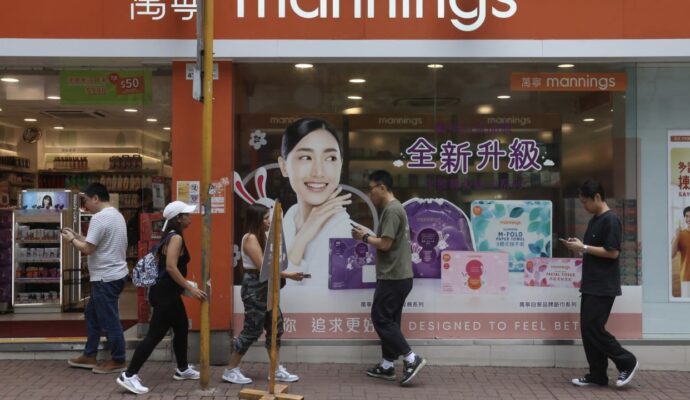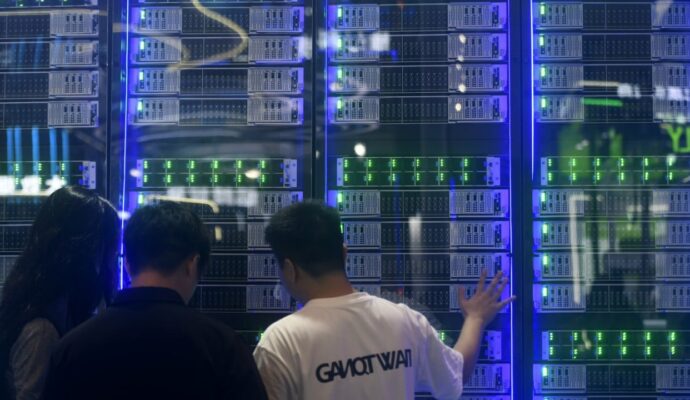He was greeted at the airport by Burns and Yang Tao, head of North American and Oceanian affairs at the Chinese foreign ministry.
Before leaving for Beijing on Saturday, Blinken said one of his goals was to set up “open and empowered communications” with Chinese officials.
He would also speak “directly and candidly about [the US’] very real concerns on a range of issues”.
“Intense competition requires sustained diplomacy to ensure that competition does not veer into confrontation or conflict,” Blinken said.
The much-anticipated talks get under way in Beijing on Sunday. Photo: Twitter @ Serena Xue Dong
Blinken is the most senior official from the Joe Biden administration to travel to Beijing.
Analysts said the visit signalled a desire by both sides to re-engage, but the prospects of a breakthrough were low.
“He is expected to establish a road map and timetable with the Chinese side on senior bilateral exchanges during the trip,” Shanghai-based news site The Paper quoted Wu Xinbo, head of US studies at Fudan University, as saying.
Qin Feng, an academic committee member of Peking University’s Institute for Global Cooperation and Understanding, said Blinken’s visit was part of preparation for Chinese President Xi Jinping’s trip to the United States in November, where he is expected to meet US President Joe Biden on the sidelines of the Apec summit.
“In a way, materialisation of Blinken’s Beijing trip is a success by itself. It marks progress in the preparation for the two nations leaders’ summit, which was delayed by the balloon incident. There is lots of catch-up to do at the working level now,” Qin Feng said.
She said Qin and Wang Yi, Xi’s top diplomacy adviser, were likely to visit the US after to nail down the details for the Chinese president’s expected trip.
It is also widely expected that US Treasury Secretary Janet Yellen and Commerce Secretary Gina Raimondo will visit China after Blinken.
China has tightened the national security scrutiny in recent months, launching investigations into several US consultancy firms and banning the sales of the US chip company Micron to Chinese clients. At the same time, the United States has put more Chinese companies on its export control list.
Blinken’s visit was confirmed on Wednesday, hours after a phone call with Qin, who stressed Beijing’s “stern position” on core issues such as Taiwan.
In his phone call with Blinken, Qin also urged the US to respect China’s sovereignty, security and development interests.
A planned visit earlier this year was halted when a suspected Chinese spy balloon – a claim denied by Beijing – flew over American territory in February. The episode fuelled tensions already rising fast after then US House speaker Nancy Pelosi’s visit to Taiwan.
Beijing regards the self-ruled island as a renegade province, to be brought under mainland control, by force if necessary. The US, like most countries, does not recognise Taiwan as an independent state, but opposes any attack on the island.
Regular talks between the world’s two largest economies were largely frozen for months, but recent high-level engagements have indicated a thaw in US-China ties.
In May, US national security adviser Jake Sullivan and China’s top diplomat Wang Yi held what both sides described as “candid, substantive and constructive discussions” on Taiwan and Russia’s war in Ukraine, over two days in Vienna.
Also last month, Chinese Commerce minister Wang Wentao held talks with Gina Raimondo.
And earlier in June, two senior US officials – Daniel Kritenbrink, assistant secretary of state for East Asian and Pacific affairs, and Sarah Beran, senior director for China and Taiwan affairs at the National Security Council – visited Beijing for “candid, constructive, fruitful discussions”.
US State Department spokesman Matthew Miller said on Wednesday that Blinken would seek to establish communication channels with China and would “stand up and speak out for our values and our interests”.


